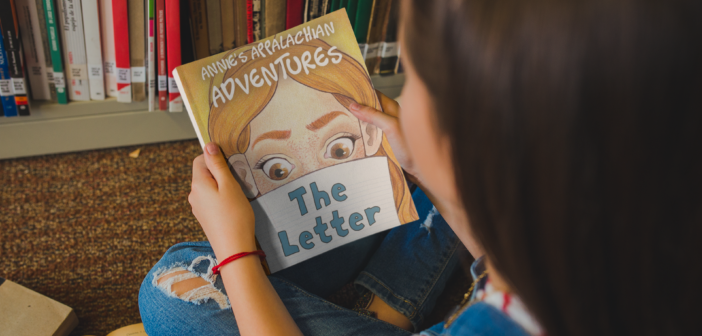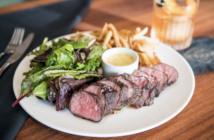Hannah Evans Helps Children Understand Emotions Through Books on Parental Struggles with Drug Abuse, Poverty, and Mental Illness
By Hannah Hottenstein
Storytelling is one of the most powerful tools we have to make a lasting impact on the lives of children. Not only does it help with building literacy and empathy, but it also holds space for each individual to tell their own story, which can lead to deep healing.
Gettysburg resident Hannah Evans is no stranger to this powerful concept; it drives her nonprofit goals and mission for helping Appalachian children.
When Evans was growing up, her great-aunt taught her that there are two kinds of people in the world: the givers and the takers. “I’ve learned that giving is what you do,” Evans says. “We only have so much time. What are we going to do with that time to make the world better than when we came?”
- Hannah Evans
As a child growing up in the second poorest county in her home state of Pennsylvania, Evans witnessed the effects of addiction, substance abuse, and poverty from an early age. Some individuals who grow up around those challenges choose to leave those memories far behind when they journey into adulthood. But Evans couldn’t turn away.
She felt drawn to becoming a teacher, which led her to spend five years of her career teaching in West Virginia, the state with the highest rate of fatal opioid overdoses.
“My district was a really economically depressed area. But what really floored me was that the students are such sweet, caring children,” Evans says. “They have so much empathy. They know how it feels to hurt. When I lived there, I wanted to give them every opportunity I could.”
Evans’ experiences teaching in West Virginia and Pennsylvania and her own personal experiences inspired her to write the The Letter, the first book of Annie’s Appalachian Adventures. The illustrated children’s book series directly addresses the emotional needs of children whose parents struggle with drugs, poverty, and mental illness.
“Research shows that we need to talk about serious issues. One of the best ways to do that is through storytelling,” Evans says. When she recognized the lack of and desperate need for resources for children affected by substance abuse within their families, Evans knew she had an opportunity to make an impact.
“There’s funding, research, and programs for the people who are suffering, but not much for the children. If you want to stop a systemic cycle of substance use, we need to heal the children,” she says.
Evans also founded Curious Kiddos, a nonprofit that aims to stop the cycle of emotional neglect in children who may fall through the cracks. The Annie’s Appalachian Adventures series is a resource that Evans’ nonprofit uses to connect with children and encourage them to face their emotions head-on and overcome challenges together.
She has now read her book to more than 200 children in dozens of classrooms in West Virginia. Students resonated deeply with hearing the word “addiction” spelled out in a story written just for them.
“Kids internalize the shame and guilt around substance abuse and addiction. They are often told by their caregivers not to talk about it, especially not at school. … And in that silence, as in any evil, it’s allowed to persist,” Evans says. “It’s all about empowerment through storytelling with a social-emotional lens.”
Evans never imagined herself founding a nonprofit, but her previous experiences and variety of skills made the process a natural extension of her instinct to give back. From cold calling to web design to intensive research to creativity, her work behind the scenes has made all the difference. She considers this convergence of skills to be serendipitous.
“I’m so grateful for Abby Rickard,” Evans says. “She is the lead guidance counselor in our school district, and she has been a huge mentor for me in this process. I don’t have a strong background in nonprofit work. I have been figuring it out as I go. There wasn’t a manual.”
Evans’ next steps involve developing pre- and post-tests for students who engage with the book. By measuring the impact of the story and the lesson plans, Evans will be able to share the resource as a data-backed, evidenced-based tool for classrooms.
Evans plans to write more books, build an after-school program, and train individuals with a background in addiction counseling to facilitate workshops. She also has dreams of establishing a job shadowing and internship program for high school students in Appalachia. She wants to help students broaden their perception of working professionals.
The response from her community has been overwhelmingly supportive, she says. After being featured on Good Day PA, Evans received feedback from a friend that inspired her to take another positive action.
“My friend, who had previously been incarcerated for drug use, said, ‘I wish I had this book when my boys came to visit me. I had no way to explain this to them.’” The next day, Evans dropped off a copy of The Letter at a nearby correctional facility.
Evans says that when students realize what The Letter is about, they start to tell their own stories, which is the result that Evans hopes to inspire with the book.
“When I was reading in West Virginia, and I got to that part, a little boy said, ‘My daddy died of drugs.’ It just came right out. The book finally gives them permission to talk about what they are feeling,” Evans says. “This book is what I would have wanted to hear when I was a child.”
To learn more about these educational resources and Curious Kiddos’ vital ongoing mission, visit www.curiouskid.org or connect with the Curious Kiddos Facebook page. You can also find current donation needs, the nonprofit’s future goals, and ways to order digital and print copies of The Letter there as well.







